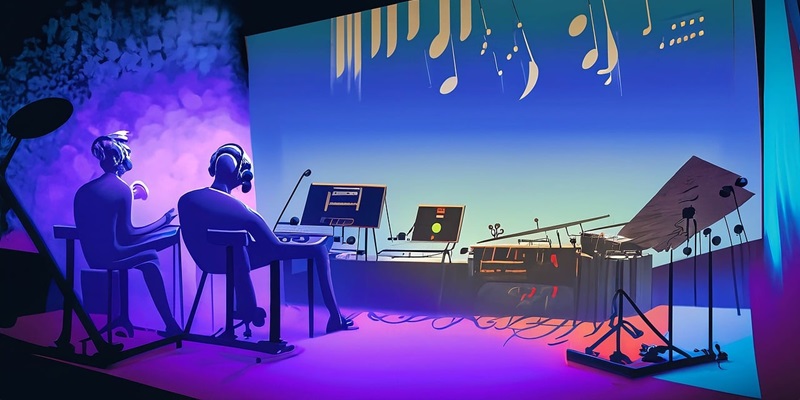In today’s rapidly advancing technological landscape, one of the most thrilling frontiers is the intersection of music and artificial intelligence (AI). This synergy between creativity and technology is redefining the very core of music composition, giving rise to innovative approaches that were once unimaginable. With AI-assisted composition tools, composers are empowered with new possibilities as they gain a collaborative partner in the form of intelligent algorithms.
The Synergy of Creativity and Technology
The introduction of AI has resulted in a paradigm shift in music composition. It involves leveraging technology to expand the boundaries of musical expression, allowing composers to break free from traditional limitations and explore uncharted territories.
Innovative Approaches
AI-powered tools and techniques have paved the way for unprecedented experimentation and creativity in music composition. These innovative approaches enable composers to discover unconventional harmonies, melodies, and rhythms, ultimately pushing the boundaries of artistic expression.
Empowering Composers with AI-Assisted Composition
A collaborative partner in intelligent algorithms: AI-assisted composition provides composers with a valuable collaborator in the form of intelligent algorithms. These algorithms analyze vast amounts of musical data, extract patterns, and generate novel ideas, serving as a source of inspiration and expanding the creative palette of composers.
New Possibilities for Composers
By integrating AI into music composition, composers gain access to a vast array of tools and techniques that enhance their artistic capabilities. These AI-assisted composition tools enable composers to explore different musical genres, experiment with varying instrumentation, and even generate entire compositions with minimal effort, providing them with a broad spectrum of creative options.
Beyond Assisting Composers
The influence of technology on music composition extends beyond mere assistance. It acts as a catalyst for composers to delve into unexplored musical ideas and concepts. By leveraging AI-powered tools, composers can quickly generate and iterate upon musical ideas, leading to a more efficient and expansive exploration process.
Enhancing the Exploration Process
AI algorithms can process vast amounts of musical data and generate real-time suggestions, opening doors to new musical possibilities. Composers can experiment with these suggestions, allowing for the discovery of unique melodies, chord progressions, and rhythms, accelerating the exploration of musical ideas and fostering an environment of innovation.
Personalization in AI Music Composition
A key advantage of AI is the ability to personalize the creative process in music composition. AI algorithms can adapt to the composer’s preferences, style, and musical sensibilities, assisting in the generation of compositions that align with the composer’s unique artistic vision.
Customizing the Creative Process
Through AI, composers can effortlessly tailor the composition process to suit their specific needs. The ability to personalize parameters such as mood, tempo, and instrumentation allows for the creation of highly individualized music compositions that resonate with both the composer and their intended audience.
Collaboration Between Humans and AI
The collaboration between humans and AI in music composition is a testament to the remarkable synergy that can be achieved when the strengths of both entities are combined. While AI possesses immense processing power and data analysis capabilities, it is the human composers who infuse the compositions with emotion, intention, and artistic expression.
Testament to Partnership
Composers who embrace AI as a creative tool recognize its ability to augment their artistic capabilities rather than replace them. This partnership between composers and AI represents a harmonious blend of human ingenuity and technological innovation, leading to truly groundbreaking musical creations.
AI as a Tool to Amplify Creative Potential
Forward-thinking composers are harnessing the power of AI as a tool to amplify their creative potential. By incorporating AI-assisted composition techniques into their workflow, composers can unlock new creative avenues, expand their artistic horizons, and produce music compositions that are truly unique and captivating.
Enhancing Creativity
AI in music composition empowers composers to think beyond their traditional approaches to music creation, encouraging them to experiment with new styles, genres, and sonic landscapes. The ability to receive real-time feedback and iterate on compositions accelerates the creative process, turning initial ideation into polished, compelling musical masterpieces.
Accelerating the Creative Process
The integration of AI-assisted composition tools enables composers to receive real-time feedback and suggestions. This instantaneous guidance allows for immediate adjustments and iterations, significantly speeding up the creative process and fostering continuous improvement in musical compositions.
Advantages of Real-Time Feedback
Real-time feedback from AI algorithms serves as a valuable resource for composers. It provides insights into the composition’s strengths, weaknesses, and opportunities for enhancement while encouraging exploration and experimentation, ultimately leading to compositions that are refined and enriched through numerous iterations.
Integration of AI Raises Important Issues
The integration of AI in music composition is not without its challenges. As technology advances, considerations regarding copyright, intellectual property, and creative ownership become crucial. Ensuring fair practices, transparency, and appropriate recognition for both human composers and AI algorithms is essential for maintaining ethical standards in this evolving landscape.
Addressing Ethical Concerns
As AI evolves in music composition, a collaborative and inclusive approach is necessary to address the ethical concerns that arise. Open dialogue among composers, industry experts, policymakers, and technology developers can ensure a balanced ecosystem that respects the creative contributions of both humans and AI algorithms.
The future of music composition is undoubtedly an exciting symphony of human ingenuity and technological innovation. AI’s integration into music composition opens up endless possibilities, empowering composers to envision and create music that transcends conventional boundaries. By nurturing the collaborative partnership between humans and AI, the creative process will continue to evolve, enabling composers to explore new frontiers, enthral audiences, and shape the evolution of music itself. As we embrace the exciting potential of AI in music composition, we embark on a transformative journey that harmonizes the genius of human creativity with the power of intelligent algorithms.

